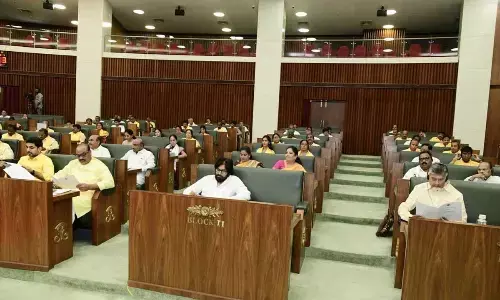Supreme Court verdict puts an uphill task before poll panel

There are religion-based parties like Majlis-Ittehadul-Muslimeen, Indian Union Muslim League and Akali Dal committed to the interests of particular religious groups only.
There are religion-based parties like Majlis-Ittehadul-Muslimeen, Indian Union Muslim League and Akali Dal committed to the interests of particular religious groups only. They are recognised by the Election Commission. Their appeal, even without pronouncing, can only be to the followers of the religions designated by the names of their parties themselves.
Will they be de-recognised if they do not drop their denominational identity?
The Supreme Court has recently ruled that if voters are canvassed by the candidates or by their agents or with the consent of either by others, through appeals to religion, caste and language, it would be a corrupt practice and therefore it attracts the punishments under the Representation of People Act of 1951.
It is astounding that the whole process is from the beginning religion and caste-based. Political parties seem to be having detailed information as to which religious community and what castes and how many members of them have voted for which party in the previous elections. So, it is obvious that the entire election process from the parties choosing the candidates to the electioneering is based upon considerations of religion and caste.
How does the Election Commission or the secular state expect that religion and caste should not be factors in voting?
It is not necessary that the voters are harangued and inspired and led to vote for particular candidates by candidates or their agents themselves. Non-party organisations, not having any consent from the candidate or his agent or his party, can ask people to vote for those who will support reservation for Muslims or who will support construction of Ram Mandir in Ayodhya or who will defeat the anti-secular, communal, casteist or family-owned parties etc.
Social organisations, not affiliated to any candidate or his party, can harangue voters, pointing out real or imagined injustice to followers of a particular religion or members of a particular caste and urge voters to vote for candidates who they think will undo injustice to them. There are religion-based parties like Majlis-Ittehadul-Muslimeen, Indian Union Muslim League and Akali Dal committed to the interests of particular religious groups only. They are recognised by the Election Commission.
Their appeal, even without pronouncing, can only be to the followers of the religions designated by the names of their parties themselves. Will they be de-recognised if they do not drop their denominational identity? What is the Election Commission supposed to do in the case of following advocacies, if they are either by candidates or their agents, or without the consent of either? Favouring some religions by not administering and managing their places of worship but doing so only in respect of another is anti-secular and so it should be done away with.
Subsidising the pilgrimages of followers of some religions but not others is anti-secular and so should be done away with. Government spending tax-payers’ money to give gifts and receptions and dinners to the followers of some religions and not giving such favours to followers of other religions is not secular and so should end.
Government spending tax-payers’ money for construction of places of worship, congregations and marriage halls meant for followers of some religions and not for others is not secular. Government establishing and financing state-funded corporations for welfare and disbursal of loans and financial assistance to people of some religious and castes and for not other religions is anti-secular and communal and casteism and such discriminatory policies and practices should be ended.
Government funding of schools imparting primarily religious instruction is anti-secular and indirect taxation on people/enterprises belonging to religions /faiths whose such schools are not funded by government. Such funding should be ended. Reservations on the basis of religions (AP & Telangana) are subversion of our Constitution.
To circumvent the constitutional bar, labelling some or all followers of casteless religion as castes and categorising them as BCs, OBCs and SCs etc. of caste-having religion(s) is a subterfuge and fraud on our Constitution; so, such policies and practices, if already resorted to, should be undone.
All these propositions are supportive and strengthening of our Constitution’s directives and guaranteed rights. As some parties and candidates are disregarding them, candidates or their agents or parties or simply non-party organisations and writers may exhort voters to vote for genuinely secularist candidates/ parties. Would this amount to corrupt practice in the view of the Supreme Court, or would reality trump its verdict?
By Dr T H Chowdary








